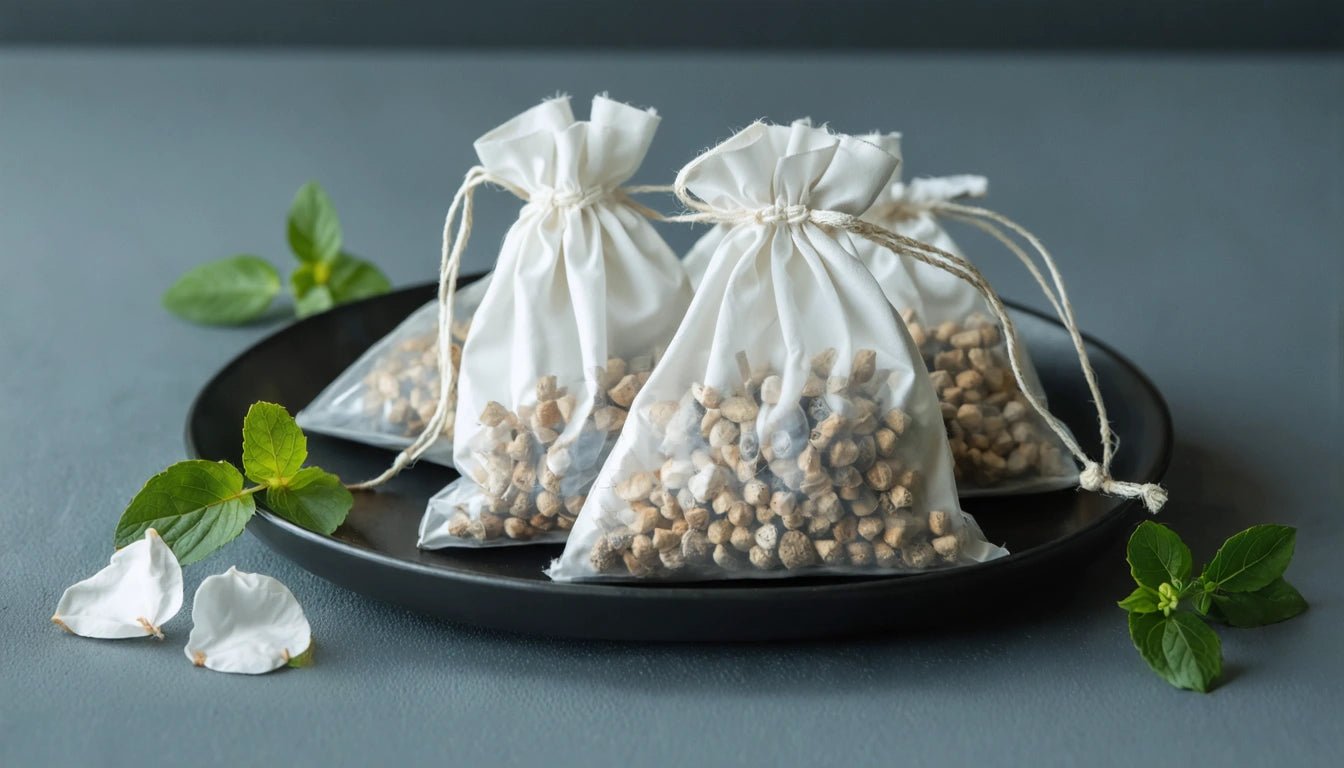Table of Contents
Understanding Sachets: Choosing the Best Closet Fresheners and Packaging Options
Sachets have become an essential household item for maintaining fresh-smelling closets and drawers. These small, often decorative pouches contain fragrant materials that release pleasant scents over time. Understanding what sachets are, how to choose the best closet sachets, and the differences between sachet packaging options can help you make informed decisions for your home or business.
What Are Sachets: Definition and Common Uses
Sachets are small sealed pouches containing aromatic substances, typically used to impart fragrance to clothing, linens, or spaces. The term "sachet" comes from the French word meaning "small bag." Unlike air fresheners that use chemicals to mask odors, sachets often contain natural materials like dried herbs, flowers, or essential oils.
Common uses for sachets include:
- Closet and drawer fresheners
- Linen and clothing scenting
- Travel fragrance solutions
- Gift and promotional items
- Sample packaging for cosmetics and perfumes
In commercial applications, sachets have evolved beyond simple scent pouches. Many companies use specialized packaging solutions for various products, ranging from food items to personal care products, demonstrating the versatility of this packaging format.
Best Closet Sachets: Materials and Scents
When selecting the best closet sachets, consider both the outer packaging material and the internal scenting ingredients. Quality sachets should balance aesthetic appeal with functional performance.
Effective Sachet Materials
The most effective sachet materials include:
- Cotton or linen fabric for breathability
- Organza for decorative appeal and scent diffusion
- Specialized paper sachets for disposable options
- Mylar bags for long-lasting scent preservation
Popular Scent Combinations
The best closet sachets typically feature these popular scent profiles:
- Lavender for calming properties and moth repellent qualities
- Cedar for natural pest deterrence
- Rosemary and mint for freshness
- Citrus blends for energizing scents
- Vanilla and sandalwood for warmer, richer aromas
Sachet vs Stick Pack Packaging: Key Differences
When comparing sachet vs stick pack packaging, several important distinctions emerge. Understanding these differences helps in selecting the right option for specific applications.
Sachets
Traditional sachets typically feature:
- Pillow-like or square/rectangular shapes
- Four-sided seals
- Flexible material construction
- Sizes ranging from 2" x 2" to 4" x 6"
- Often made with decorative or semi-permeable materials
Stick Packs
In contrast, stick packs are characterized by:
- Elongated, narrow tube-like shape
- Three-sided seals
- Typically used for single-serving powders or liquids
- Sizes approximately 1" x 5" or similar proportions
- Usually made with moisture-barrier materials
Understanding different packaging formats is essential for businesses considering various product delivery methods. While sachets are ideal for fragrance and larger portions, stick packs excel for precise dosing of concentrated products.
DIY Sachets: Creating Custom Closet Fresheners
Creating your own sachets allows for customization of both scents and visual design. Making your own scented sachets at home is surprisingly simple and cost-effective.
Basic DIY Sachet Recipe
- Small fabric pouches (4" x 4" is standard)
- Dried lavender, rose petals, or herbs of choice
- Essential oils for scent enhancement
- Optional fixatives like orris root
- Decorative ribbon or string for closure
For those seeking stronger therapeutic benefits, consider adding ingredients similar to those found in homemade vapor rubs, such as eucalyptus or mint, which can help with respiratory comfort while also freshening your closet.
Packaging Considerations for Sachets
Whether for personal use or commercial production, selecting the right packaging for sachets involves several key considerations:
Material Selection
The material must balance:
- Permeability for scent release
- Durability for extended use
- Aesthetic appeal for visible applications
- Sustainability concerns
Choosing sustainable packaging options has become increasingly important as consumers prioritize eco-friendly products. Biodegradable materials and minimal packaging waste are key considerations for modern sachet production.
Design Elements
Effective sachet design incorporates:
- Clear branding for commercial products
- Appropriate typography, with sans-serif fonts often preferred for modern appeal
- Color psychology aligned with the scent profile
- Information about contents and usage
For commercial sachet producers, taking inspiration from top cosmetic packaging designs can help create sachets that stand out in the marketplace while effectively communicating brand values.
Future Trends in Sachet Packaging and Sustainability
The sachet industry is evolving rapidly with several emerging trends:
- Biodegradable and compostable materials replacing traditional plastics
- Refillable sachet systems reducing waste
- Integration of QR codes linking to product information
- Dual-function sachets that both scent and clean the air
- Subscription-based models for regular sachet replacement
As with other packaging solutions like cardboard packaging alternatives, the future of sachets lies in balancing functionality with environmental responsibility. Manufacturers are increasingly focusing on creating sachets that deliver excellent performance while minimizing ecological impact.
Understanding what sachets are, selecting the best closet sachets for your needs, and recognizing the differences between sachet vs stick pack packaging options empowers consumers to make informed choices. Whether purchasing commercial products or creating DIY versions, sachets remain an effective, versatile solution for keeping spaces fresh and pleasantly scented.



















